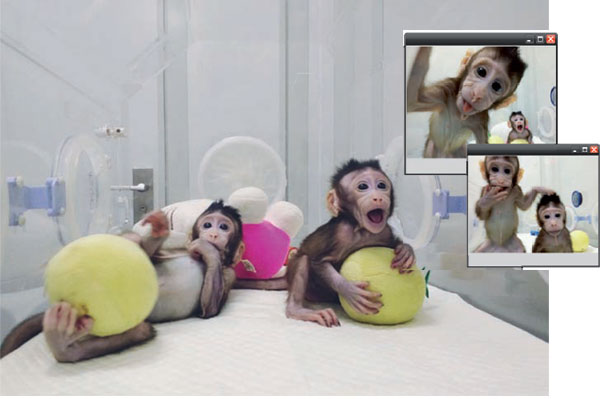China says it has cloned a monkey using non-reproductive cells, a 1st
China became the first country to clone a monkey using non-reproductive cells, reducing the need to breed lab monkeys and paving the way for more accurate, effective, and affordable animal tests for new drugs, scientists said on Thursday.
By December, the Institute of Neuroscience of the Chinese Academy of Sciences had created two clone macaques named "Zhong Zhong" and "Hua Hua" by nuclear transferring of somatic cells-- any cell in the organism other than reproductive cells. This was the similar technology used to create the famous clone sheep Dolly in 1996.
Tetra, a rhesus monkey born in 1999, is the world's first ever-cloned monkey, but it was done using a simpler method called embryo splitting, but it could only generate four cloned offspring at a time and cannot be genetically modified to suit experimental needs, said Pu Muming, an academician at the Chinese Academy of Sciences and the director of Institute of Neuroscience, CAS.
"Cloning a monkey using somatic cells has been a world-class challenge because it is a primate that shares its genetic makeup, therefore all of its complexity, with humans," he said.
"For drug and other lab tests, scientists have to purchase monkeys from all over the world, which is costly, bad for the environment and produces inaccurate results because each monkey might have different genes,"Pu said.
"By cloning monkey using somatic cells, we can mass cultivate large number of genetically identical offspring in a short amount of time, and we can even change their genes to suit our needs,"he added. "This can save time, cut down experiment costs, and produce more accurate results, leading to more effective medicine."
Sun Qiang, director of the non-human primate research facility at the institute, said most of the drug trials are currently done on lab mice. However, drugs that work on mice might not work or even have severe side effects on humans because the two species are so different.
"Monkeys and Humans are both primates, so they are much closely related and testing on Monkeys is supposed to be as effective as testing on humans," he said. This is especially useful in testing drugs for neural diseases such as Parkinson's disease, metabolic and immune system disease, and tumor, he added.
"This achievement will help China lead the world research in an international science projects related to neural mapping of primate brains," he said. However, bio labs from the United States, Japan, and European countries are also very capable, and they will quickly catch up to China after the monkey cloning technology is made public, Sun added.
"This means we have to innovate continuously and work extra harder this year to stay ahead," he said.
zhangzhihao@chinadaily.com.cn
|
Zhongzhong and Huahua, the world's first cloned monkeys using somatic cells, play in their chamber at the Chinese Academy of Sciences Institute of Neurosciences in Shanghai. Provided to China Daily |
(China Daily USA 01/25/2018 page1)

















